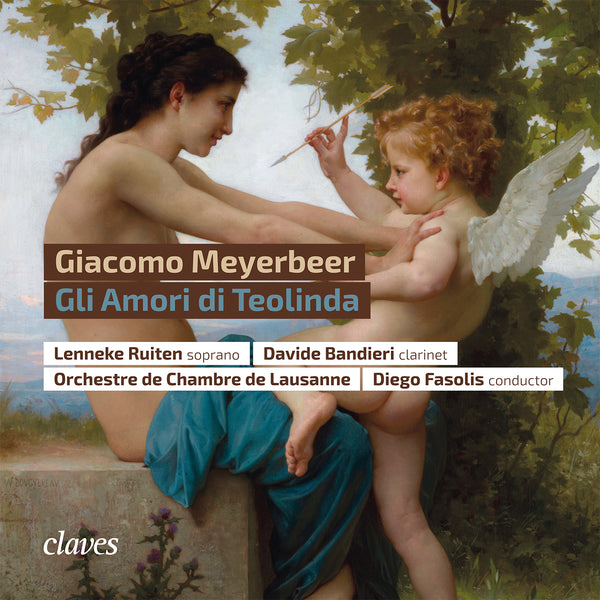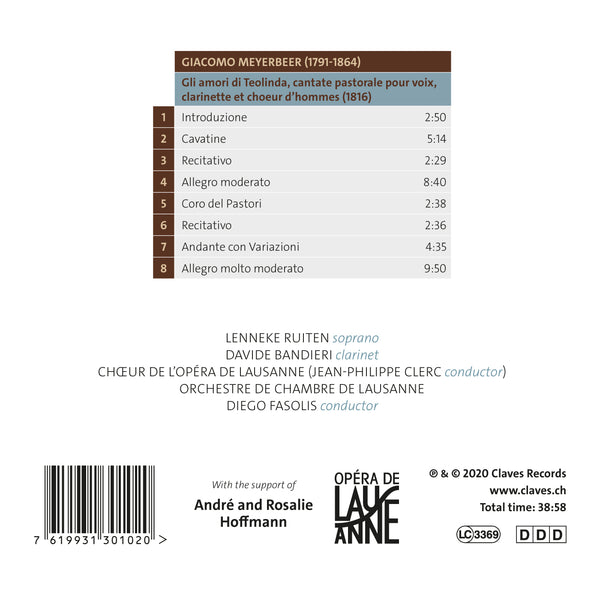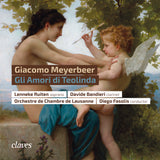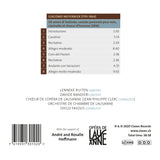(2020) Giacomo Meyerbeer: Gli Amori di Teolinda
Category(ies): Oper vocal Orchestra Rarities
Instrument(s): Clarinet
Vocal(s): Soprano
Main Composer: Giacomo Meyerbeer
Orchestra: Orchestre de Chambre de Lausanne
Conductor: Diego Fasolis
CD set: 1
Catalog N°:
CD 3010
Release: 04.09.2020
EAN/UPC: 7619931301020
This album is now on repressing. Pre-order it at a special price now.
CHF 18.50
This album is no longer available on CD.
This album has not been released yet. Pre-order it from now.
CHF 18.50
This album is no longer available on CD.
CHF 18.50
VAT included for Switzerland & UE
Free shipping
This album is no longer available on CD.
VAT included for Switzerland & UE
Free shipping
This album is now on repressing. Pre-order it at a special price now.
CHF 18.50
This album is no longer available on CD.
This album has not been released yet.
Pre-order it at a special price now.
CHF 18.50
This album is no longer available on CD.
CHF 18.50
This album is no longer available on CD.
GIACOMO MEYERBEER: GLI AMORI DI TEOLINDA
Gli Amori di Teolinda
Berliner by birth, from a wealthy family who gave him a complete education, piano prodigy, Giacomo Meyerbeer remained in the history of music thanks to his great French operas, premiered at the Paris Opera in the 1830s and 1860s, such as Robert le Diable, Les Huguenots, Le Prophète, L’Africaine, or at the Opéra Comique, such as L’étoile du Nord and Dinorah. Occasionally revived nowadays, these great lyrical frescoes in 5 acts met at the time with an audience receptive to the human passions that filled the lyrics, whilst imposing ballets and substantial scenography gave them a much-appreciated local touch, the whole based on famous pages of history. Meyerbeer was at the time performed more than Verdi or Wagner. Not so with Gli amori di Teolinda, a pastoral cantata, written on a text by Gaetano Rossi, a prolific Veronese librettist, on behalf of Rossini (Tancredi, Semiramide...), Donizetti (Linda di Chamounix...) and later Meyerbeer in his Italian period. Indeed, no great span of history runs through the story of Teolinda’s unfortunate passion for the shepherd Armidoro. Meyerbeer was 25 years old when Teolinda was premiered in Verona in 1816.
Five years earlier, the success of both his oratorio Gott und die Natur and lyrical premieres that were acclaimed in Munich and Stuttgart encouraged him to compose for the stage. However, he was aware that true lyrical culture could only be achieved through contact with Italy, where Rossini triumphed. Meyerbeer was to immerse himself in it, integrating its vocal and instrumental writing. Gli amori di Teolinda reveals this with the virtuosity of the solo clarinet, often concertante with Rossini, and the stunning coloratura required of the soprano. Clarinettist Heinrich Baermann and soprano Helene Harlas, childhood friends of Meyerbeer’s whom he met again in Verona, were the first interpreters of Teolinda. In this small bucolic drama, as far as the voice of the shepherd Armidoro is concerned, Teolinda only perceives the echo of a presence suggested by the clarinet, insensitive to her complaint, unable to give her the response she would like. The interventions of the shepherds’ choir, however entertaining they may be, do nothing to alleviate the pain of the lovesick Teolinda, finally won over by the virtuosity of the elusive clarinet, alias Armidoro, in a concertato of the purest, perfectly mastered Rossinian style.
One should also recall Mozart in Teolinda’s heartfelt complaints as well as in the use of the clarinet. In this easy-going 18th-century classicism script, still appreciated in 1815, with its pastoral moors, its shepherds and its slightly conventional plot, Meyerbeer already revealed what was to become his trademark: that of a composer skilled in handling different styles, a master of orchestration unrivalled by his peers and contemporaries whenever it came to giving his characters the humanity and credibility essential to the art of lyricism.
Olivier Cautrès
Translated from French by Isabelle Watson
Lenneke Ruiten Soprano
Lenneke Ruiten studied the flute and singing at the Royal Conservatoire The Hague and the Bayerische Theaterakademie in Munich. In 2002 she received several awards at the International Vocal Competition in ’s-Hertogenbosch. Currently, she is one of the most sought-after sopranos and follows an acclaimed international career in both opera and concert performances. She has sung at the Opéra de Paris, at Teatro alla Scala, at La Monnaie, and in Amsterdam, Stuttgart, Vienna and Lausanne in some of Mozart’s roles, such as Konstanze, Pamina, Susanna, Fiordiligi, Donna Anna and Giunia (Lucio Silla); she has also sung Zerbinetta, Almirena, Sophie, Ophélie, Iphigenie and Angelica (Orlando), and the title-role in Lucia di Lammermoor.
She is a regular guest at the festivals of Salzburg, Aix-en-Provence, Edinburgh, Mostly Mozart Festival, BBC Proms, Leipzig Bach Festival, Prague Spring Festival, Aldeburgh Festival, Lucerne Festival, Holland Festival and the Drottningholm Festival. Her plans include Agathe (Der Freischütz) in Strasbourg, Rinaldo at the Ópera de Oviedo, Donna Elvira, Fiordiligi and the title-role in Maria Stuarda at La Monnaie. At the Opéra de Lausanne: Pamina in Die Zauberflöte (2010), Almirena in Rinaldo (2011), and Lucia in Lucia di Lammermoor (2017).
Davide Bandieri Clarinet
Principal clarinettist of the Lausanne Chamber Orchestra, Davide Bandieri was taught by Dario Goracci at the Istituto Superiore di studi musicali Pietro Mascagni in Livorno from which he graduated in 1997. He completed his education with Fabrizio Meloni and Karl Heinz Steffens, then on the Mythos course at the Fondazione Arturo Toscanini with Alessandro Carbonare.
In 2002, he won first prize at the triennial chamber music competition at the International Piano Academy ‘Incontri col Maestro’ in Imola. From 2004 to 2011, he played solo E-flat clarinet with the Orquesta Sinfônica de Madrid. Since 2012, he has been first solo clarinet with the Lausanne Chamber Orchestra, and first clarinet with the Camerata Strumentale orchestra in Prato (Tuscany). He has worked with numerous orchestras and prestigious conductors such as Claudio Abbado, Riccardo Muti, Daniel Harding, Giuseppe Sinopoli, Kent Nagano, Gianluigi Gelmetti and Bruno Bartoletti. He is also very active in the creation of contemporary music.
Gli Amori di Teolinda
Berliner by birth, from a wealthy family who gave him a complete education, piano prodigy, Giacomo Meyerbeer remained in the history of music thanks to his great French operas, premiered at the Paris Opera in the 1830s and 1860s, such as Robert le Diable, Les Huguenots, Le Prophète, L’Africaine, or at the Opéra Comique, such as L’étoile du Nord and Dinorah. Occasionally revived nowadays, these great lyrical frescoes in 5 acts met at the time with an audience receptive to the human passions that filled the lyrics, whilst imposing ballets and substantial scenography gave them a much-appreciated local touch, the whole based on famous pages of history. Meyerbeer was at the time performed more than Verdi or Wagner. Not so with Gli amori di Teolinda, a pastoral cantata, written on a text by Gaetano Rossi, a prolific Veronese librettist, on behalf of Rossini (Tancredi, Semiramide...), Donizetti (Linda di Chamounix...) and later Meyerbeer in his Italian period. Indeed, no great span of history runs through the story of Teolinda’s unfortunate passion for the shepherd Armidoro. Meyerbeer was 25 years old when Teolinda was premiered in Verona in 1816.
Five years earlier, the success of both his oratorio Gott und die Natur and lyrical premieres that were acclaimed in Munich and Stuttgart encouraged him to compose for the stage. However, he was aware that true lyrical culture could only be achieved through contact with Italy, where Rossini triumphed. Meyerbeer was to immerse himself in it, integrating its vocal and instrumental writing. Gli amori di Teolinda reveals this with the virtuosity of the solo clarinet, often concertante with Rossini, and the stunning coloratura required of the soprano. Clarinettist Heinrich Baermann and soprano Helene Harlas, childhood friends of Meyerbeer’s whom he met again in Verona, were the first interpreters of Teolinda. In this small bucolic drama, as far as the voice of the shepherd Armidoro is concerned, Teolinda only perceives the echo of a presence suggested by the clarinet, insensitive to her complaint, unable to give her the response she would like. The interventions of the shepherds’ choir, however entertaining they may be, do nothing to alleviate the pain of the lovesick Teolinda, finally won over by the virtuosity of the elusive clarinet, alias Armidoro, in a concertato of the purest, perfectly mastered Rossinian style.
One should also recall Mozart in Teolinda’s heartfelt complaints as well as in the use of the clarinet. In this easy-going 18th-century classicism script, still appreciated in 1815, with its pastoral moors, its shepherds and its slightly conventional plot, Meyerbeer already revealed what was to become his trademark: that of a composer skilled in handling different styles, a master of orchestration unrivalled by his peers and contemporaries whenever it came to giving his characters the humanity and credibility essential to the art of lyricism.
Olivier Cautrès
Translated from French by Isabelle Watson
Lenneke Ruiten Soprano
Lenneke Ruiten studied the flute and singing at the Royal Conservatoire The Hague and the Bayerische Theaterakademie in Munich. In 2002 she received several awards at the International Vocal Competition in ’s-Hertogenbosch. Currently, she is one of the most sought-after sopranos and follows an acclaimed international career in both opera and concert performances. She has sung at the Opéra de Paris, at Teatro alla Scala, at La Monnaie, and in Amsterdam, Stuttgart, Vienna and Lausanne in some of Mozart’s roles, such as Konstanze, Pamina, Susanna, Fiordiligi, Donna Anna and Giunia (Lucio Silla); she has also sung Zerbinetta, Almirena, Sophie, Ophélie, Iphigenie and Angelica (Orlando), and the title-role in Lucia di Lammermoor.
She is a regular guest at the festivals of Salzburg, Aix-en-Provence, Edinburgh, Mostly Mozart Festival, BBC Proms, Leipzig Bach Festival, Prague Spring Festival, Aldeburgh Festival, Lucerne Festival, Holland Festival and the Drottningholm Festival. Her plans include Agathe (Der Freischütz) in Strasbourg, Rinaldo at the Ópera de Oviedo, Donna Elvira, Fiordiligi and the title-role in Maria Stuarda at La Monnaie. At the Opéra de Lausanne: Pamina in Die Zauberflöte (2010), Almirena in Rinaldo (2011), and Lucia in Lucia di Lammermoor (2017).
Davide Bandieri Clarinet
Principal clarinettist of the Lausanne Chamber Orchestra, Davide Bandieri was taught by Dario Goracci at the Istituto Superiore di studi musicali Pietro Mascagni in Livorno from which he graduated in 1997. He completed his education with Fabrizio Meloni and Karl Heinz Steffens, then on the Mythos course at the Fondazione Arturo Toscanini with Alessandro Carbonare.
In 2002, he won first prize at the triennial chamber music competition at the International Piano Academy ‘Incontri col Maestro’ in Imola. From 2004 to 2011, he played solo E-flat clarinet with the Orquesta Sinfônica de Madrid. Since 2012, he has been first solo clarinet with the Lausanne Chamber Orchestra, and first clarinet with the Camerata Strumentale orchestra in Prato (Tuscany). He has worked with numerous orchestras and prestigious conductors such as Claudio Abbado, Riccardo Muti, Daniel Harding, Giuseppe Sinopoli, Kent Nagano, Gianluigi Gelmetti and Bruno Bartoletti. He is also very active in the creation of contemporary music.
Return to the album | Read the booklet | Composer(s): Giacomo Meyerbeer | Main Artist: Lenneke Ruiten




STUDIO MASTER (HIGH-RESOLUTION AUDIO)
Amethys Design
CD of the month - Opera Nederland
Chœur de l'Opéra de Lausanne
Clarinet
Claves picks
Co-productions RTS / Espace 2
Davide Bandieri
Diego Fasolis
Giacomo Meyerbeer
High-resolution audio - Studio master quality
ICMA 2021 nominees
In stock
Joker - Crescendo Magazine
Lenneke Ruiten
Opera vocal
Orchestra
Orchestre de Chambre de Lausanne (OCL)
Rarities
Soprano
Amethys Design
CD of the month - Opera Nederland
Chœur de l'Opéra de Lausanne
Clarinet
Claves picks
Co-productions RTS / Espace 2
Davide Bandieri
Diego Fasolis
Giacomo Meyerbeer
High-resolution audio - Studio master quality
ICMA 2021 nominees
In stock
Joker - Crescendo Magazine
Lenneke Ruiten
Opera vocal
Orchestra
Orchestre de Chambre de Lausanne (OCL)
Rarities
Soprano















